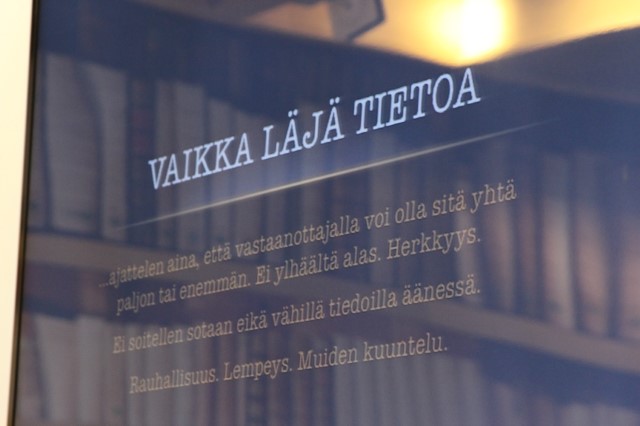The United States presidential election was exceptionally controversial and stirred a lot of emotions. From the perspective of communications, four words came to my mind as I was following the competition between the two candidates: truth, interpretation, hope and awareness. As we respond to the challenges of the post-truth society, we should learn to distinguish truthful facts from truth-like information. As the information concerned with complex phenomena can often be of a conflicting nature, active interpretation is needed for processing it. Information should not only be interpreted from the viewpoint of personal agendas but, instead, together, in a dialogue and by creating a new understanding. It is also important to build hope and enthusiasm for the future based on a mutual understanding, and to remain self-critical and aware of how we communicate and act in our daily lives. From truth-like to truthful information Even though four out of five statements made by Donald Trump during his campaign were shown to be at least partially untrue, his campaign proved to be victorious. Similar trends could be spotted in the Brexit referendum. Indeed, ignoring the facts was even part of the communications strategy of those in favour of leaving the European Union. So why are facts perceived as less important than before? Mass media has been losing ground as the gatekeeper of information because the internet has made it possible for anyone to publish and distribute information, whatever their underlying motivation. Many online applications profile their users and provide them with topics and viewpoints in line with the preferences demonstrated by the user. We are no longer exposed to content challenging our world view to the extent we were previously. We also tend to believe the ideas that verify what we already believe in. In addition, repeating something frequently enough will make it seem like the truth. For their part, the multitude and conflicting nature of facts makes people question the certainty of the truth or even the existence of a so-called “truth”. It is not simply a question of what we believe in, but often also who we consider reliable. These days, the man on the street is perceived to be as reliable as a journalist or a politician, even in many matters that require expertise. In recent times, many have claimed that Western societies are entering a so-called post-truth era. We have moved away from seeking the truth (truthfulness) towards truth-like information, something people know “intuitively” as the right thing because it feels right, regardless of whether it is supported by evidence. We may ask whether we really are dealing with a new concept here. After all, have people not always been interpreting or shaping the truth to some extent to make it fall in line with their own beliefs? Nevertheless, something new is related to this development, namely the exponential growth of fact-checking operations, not only in the United States but also in the context of Brexit and the Ukrainian crisis, for example. Fact checking is a process where journalists aiming to be unbiased follow political discussion, pick key assertions from the discourse and publish an estimate of their veracity in real time. For instance, people could follow the US Presidential debates simultaneously on TV and a fact-checking website, which is not dissimilar to how someone might watch an ice hockey game on TV while listening to the more in-depth commentary on the radio. Even though checking the facts can barely prevent misunderstandings, it can at best influence the tone of public discourse. It can create pressure for influencers and help prevent small delusional statements from growing into wide networks of lies. From selecting information to building shared interpretations Our world appears increasingly complicated and making sense of it is becoming more and more difficult. When it comes to complicated issues, there might be contradictions between research, anticipation, experience and tacit knowledge, and different fields of science may end up giving different recommendations, all of them fully legitimate ones. There are currently such contradictions, for instance, in the discussion on forests, energy and the environment. For example, forests are on one hand perceived to provide a solution to the climate change, while posing a challenge to it on the other. When it becomes increasingly difficult to get to grips with what is the “correct information” on complicated issues, there is need for interpretation. Interpretation is not a matter of selecting information based on personal interests, as seen in the US presidential elections. Instead, it is a question of creating new and mutual understanding through dialogue that makes room for multiple perspectives. Bursting bubbles with hope Holding onto falsehoods is often a result of a feeling of hopelessness. When someone’s world view and values fundamentally contradict the prevailing knowledge, their internal conflict, hopelessness and anxiety make them withdraw into a “bubble” where he or she is out of the reach of the agonising information. A person living in a bubble will not listen to any facts but will, instead, deny them and only seek the company of those who see things similarly. What can come to their rescue, then? The answer is hope. Without hope, there is no motivation to work for the future. In addition to hope, then, we need a positive story that people can identify with. Awareness In the end, we also need to be self-critical of how we use and interpret information in our own actions and daily lives. From time to time, it is good that we ask ourselves whether we are taking different viewpoints sufficiently into account in our own actions, or are we rather simply trying to find ways to justify our own interpretations? Do I sometimes silently approve of things I do not perceive as the truth? Does the senior management of my organisation actually base its operations on the knowledge provided for it? Do I challenge the views of the management based on the evidence I know? And does the culture of my organisation allow constructive challenging of the views of the management? This text is based on a speech given at the opening ceremony of the Metsäpäivät (forest days) event organised by the Finnish Forests Association on 10 November 2016. The Weekly notes blog deals with current topics in Sitra’s strategy and research teams. You can find more Weekly notes blogs here.
This post has been archived and may include outdated content
How do we communicate in a post-truth world?
Who can – and should – we trust in today's changing media environment?



Recommended